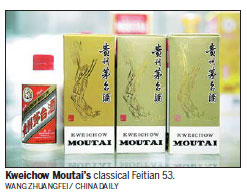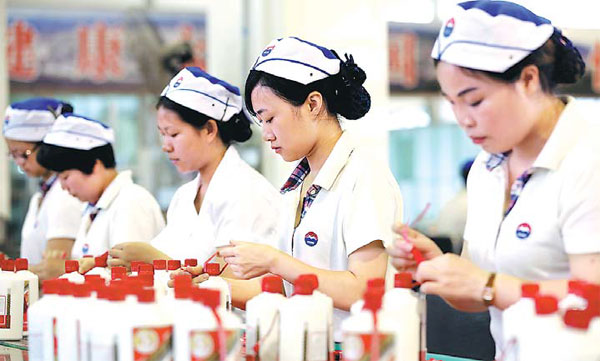Bottles of bliss flavored with history pay homage to the joys of social drinking
Few things in life can tickle a man's fancy more than the pretty girls of the ethnic Miao tribe pouring rice liquor down his throat from a cup in the shape of a cow horn. The Miao maidens order you not to touch the horn as they tilt your head backward. You are at their mercy. You guzzle down the sweet spirit to the accompaniment of high-pitched singing, drum beats and the piercing sounds of native musical instruments.
This chug-a-lug ritual isn't your typical American beer blast. Here in Guizhou province, you are gulping down 80 proof grain alcohol. The girls in their embroidered dresses and silver ornaments are dazzling. And the memory lingers long after you have sobered up.
In some ways, the booze fest was the closing ceremony of our four-day excursion through the heart of China's white liquor country, co-sponsored by China Daily and the Kweichow Moutai, producers of Moutai, the nation's most famous luxury liquor.
Our journey began in the mountain town of Maotai, the Holy Grail of white liquor, which lives up to its name as the birthplace of China's national beverage. As a visitor, you don't just experience the sights of Maotai, you inhale them. The air is suffused with the fragrance of fermenting wheat and sorghum from 20 different distilleries that use fundamentally the same basic handmade brewing methods they have used for the past 200 years.
Even for Americans who can't stomach the taste of Moutai and think it smells like paint thinner, the town and its spectacular mountain scenery are a fascinating tourist destination.
Here, you learn that China's 4,000-year-old drinking culture blends elements of the nation's political, military and literary history. Maotai, an entire town built on booze, has even erected a liquor museum and living history park, featuring archeological relics of ancient liquor urns and drinking jugs.
The museum centerpiece is a fresco of Du Kang, the God of Liquor, pouring out the magic elixir as God's gift to future generations.
A statue honoring legendary Chinese poet Li Bai shows the great man flopped down on the ground, presumably nursing a hangover after composing verses such as:
"Let me be forever drunk and never come to reason!
Sober men of olden days and sages are forgotten,
And only the great drinkers are famous for all time."
Elsewhere, statues and photos show Chinese leaders since the days of Mao Zedong using Moutai as an icebreaker in meetings with foreign leaders, including US presidents Richard Nixon and Barack Obama.
At the Kweichow Moutai bottling plant, you can watch assembly line workers package the white porcelain bottles at lighting speed, producing more than 30,000 tons last year.
Despite reports that the liquor industry has been hurt by President Xi Jinping's anti-corruption crackdown on luxury gift giving, Moutai authorities shrug off the reports, noting that last year: "We sold out." That's impressive, considering that the average price of authentic Moutai is close to $195 dollars a bottle.
By night, Maotai town is lit up like a Disney village, with a laser light show and Las Vegas-style dancing fountains. By day, our white liquor odyssey continued through the amazing mountain cliffs rising above the Chishui River.
The friendly folks along the "Beautiful Liquor River" say there's a mystery to the taste of white liquor, and they are not sure what it is. Perhaps it's the pure water draining down from mountains where dinosaurs once roamed, or the red clay deposits used to ferment the grain. For whatever reasons, the valley has spawned a flabbergasting variety of baijiu flavors, fermented from dozens of distilleries along the river banks.
Chishuihe, the "Red Water River", is itself part of baijiu lore. Arriving in Zunyi city, we visited a sacred shrine in Chinese Communist history. Here, in January 1935, Mao Zedong and 30,000 Red Army troops faced 400,000 Kuomintang soldiers. Mao's troops used a distillery in Maotai as a makeshift hospital where baijiu was used to sterilize wounds and lift spirits. Thus was white liquor enshrined as the essence of modern Chinese history, a bottle of bliss without which no Chinese wedding, holiday celebration or business deal is complete.
Our white liquor tour group may not pass this way again, but like most golden opportunities, you wouldn't want to miss it. And with every future swig of baijiu, your taste buds will remember.
The author is a freelance writer from the United States.
barry.cunningham34@yahoo.com
|
Workers at Kweichow Moutai's bottling plant tie the signature red ribbons onto the typical milky white bottles of Moutai. Jiang Dong / China Daily |

(China Daily 07/08/2016 page6)















